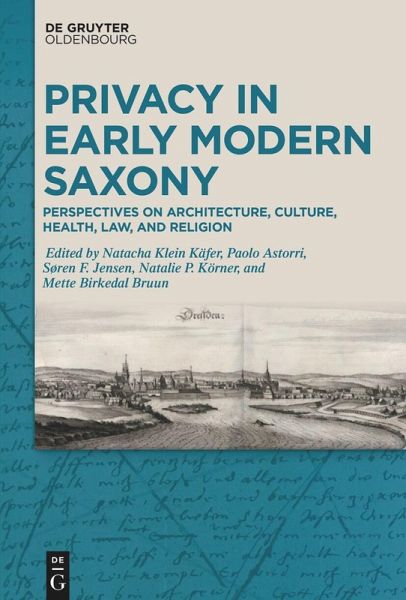
Privacy in Early Modern Saxony
Perspectives on Architecture, Culture, Health, Law, and Religion
Herausgegeben: Klein Käfer, Natacha; Astorri, Paolo; Jensen, Søren Frank; Körner, Natalie Patricia; Bruun, Mette Birkedal
Versandkostenfrei!
Sofort lieferbar
60,99 €
inkl. MwSt.

PAYBACK Punkte
30 °P sammeln!
Concerns over privacy grow in our society. Understanding the historical roots of the phenomenon becomes more and more necessary to navigate our contemporary struggles with availability and control of personal information. When we ponder what people of the past valued and aimed to protect and what they considered threatening and needing uncovering, we achieve a broader perspective of the importance of privacy in everyday life. The early modern period, in particular, was a period in which many views and experiences of privacy were negotiated and consolidated into more recognisable feelings and n...
Concerns over privacy grow in our society. Understanding the historical roots of the phenomenon becomes more and more necessary to navigate our contemporary struggles with availability and control of personal information. When we ponder what people of the past valued and aimed to protect and what they considered threatening and needing uncovering, we achieve a broader perspective of the importance of privacy in everyday life. The early modern period, in particular, was a period in which many views and experiences of privacy were negotiated and consolidated into more recognisable feelings and norms in different layers of society.
This volume will focus on Saxony, as it is a great example to explore how privacy was created and negotiated in the early modern period. Throughout the sixteenth century, Saxony rose to prominence in the broader European context through the influence of its Electors. Saxony is an emblematic context to explore notions of privacy in the early modern period, as the region underwent a range of transformations - religious, political, legal, and cultural - that reconfigured the thresholds between the private and the public.
The main goals of this volume are: to put Saxony on the map of early modern studies of privacy by bringing forth the region's contribution to political, cultural, scientific, religious, and legal developments; to challenge preconceived notions of privacy in the early modern German context by providing new analytical tools to analyse both well-known and novel sources; to inaugurate and instigate further the research of early modern privacy in regional studies.
This volume will focus on Saxony, as it is a great example to explore how privacy was created and negotiated in the early modern period. Throughout the sixteenth century, Saxony rose to prominence in the broader European context through the influence of its Electors. Saxony is an emblematic context to explore notions of privacy in the early modern period, as the region underwent a range of transformations - religious, political, legal, and cultural - that reconfigured the thresholds between the private and the public.
The main goals of this volume are: to put Saxony on the map of early modern studies of privacy by bringing forth the region's contribution to political, cultural, scientific, religious, and legal developments; to challenge preconceived notions of privacy in the early modern German context by providing new analytical tools to analyse both well-known and novel sources; to inaugurate and instigate further the research of early modern privacy in regional studies.












